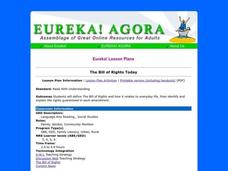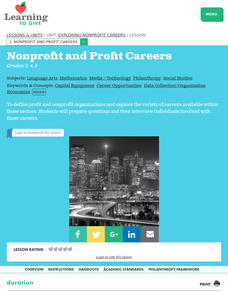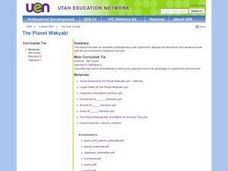Curated OER
The Bill of Rights Today
High schoolers examine the Bill of Rights, They read the Bill of Rights and clarify the meaning of the material using different reading strategies. In groups, students brainstorm to compare and evaluate their conclusions with those of...
Curated OER
Rock Art
First graders create and share their own rock art based on Navajo and Hawaiian rock art.
Curated OER
Transport
Students analyze wind barbs and determine which way the wind is blowing and how hard the wind is blowing. They access near real time wind data and pollutant animations to track the transport and destination of pollutants.
Curated OER
Nonprofit Environmental Groups
Students examine the importance of nonprofit organizations when it comes to the environment. They discover how to evaluate different organizations. They research different organizations and present their findings to the class.
Curated OER
Nonprofit and Profit Careers
Students examine the difference between profit and nonprofit organizations. They identify careers that are available in each sector as well. They develop their own questions and interview people who are in those careers.
Curated OER
The Planet Wakyabi
Fifth graders explain how organisms' specialized structures and variations work with the environment to help them survive.
Curated OER
Fossil Footsteps
Fourth graders create their own dinosaur tracks using clay. In addition, 4th graders compose a story about the dinosaur / animal who created the tracks. They study photographs of dinosaur tracks before beginning.
Curated OER
Barnacles: Harder than Cement
Fourth graders watch the movements of the complex animal hidden inside the tiny barnacle shells. This lesson plan allows students to study the behavior, adaptation, and larval stage of the barnacle.
Curated OER
The Write Thing to Do
Students examine the proper way to write formal business letters. Students apply the skill to write letters to appropriate environmental protection agencies.
Curated OER
Volcanoes
Fifth graders study volcanoes. They watch a demonstration that represents the eruption of a volcano and discuss the similarities and differences between the model and a real volcano.
Curated OER
Student Viewing Guide: "The Alternative Fix"
Students discuss the merits of and problems with alternative medicines after watching a documentary entitled "The Alternative Fix." They discuss the documentary after completing the viewing guides.
Curated OER
Pyramid Play
Learners investigate the concept of the Food Pyramid. They use a game as a tool of discovery in order to classify different types of food in the pyramid. Upon completion of the game the students construct their own models of it.
Curated OER
Calculating Postage
Learners explore the services available to them at their local post office. As a class, students discuss the function of each method of delivery. Learners choose a postal option appropriate to a scenario the instructor provides. This...
Curated OER
Air Quality and Transportation
Second graders study about air pollution and the effects it has on our Earth. Students tally cars on a sheet that has been categorized as follows: One person in car, two persons in car, or three or more persons in car. Students go to...
Curated OER
Time Capsule
First graders collect data in the fall and again in the spring. they use the data from both seasons to compare and contrast changes over time. They put the data from the fall into a box or "time capsule." The teacher encourages students...
Curated OER
Why Walk?
First graders listen to the book Yummers. They use the food pyramid to evaluate what Emily Pig ate during her walk and find out why her walk made her sick. They participate in a walking game.
Curated OER
The Great Hungarian Toxic Disaster
Ninth graders examine the the toxic spill in Hungary. In this Hungarian instructional activity, 9th graders read an article and answer guided questions. Students write an email to their teacher explaining the causes and effects of the...
Curated OER
Chemistry: Balancing Chemical Equations
Eighth graders practice balancing chemical equations. In this chemistry lesson, 8th graders explain why it is necessary to balance equations. They complete practice worksheets individually.
Curated OER
Firstgov for Kids
Students examine kids.gov, FirstGov for Kids website, which provides links to both Federal kids sites and sites from other organizations. They complete a worksheet by finding answers at the website.
Alabama Learning Exchange
Alex: News Flash: The End of the Cold War
This lesson is an inquiry into events that occurred during the Cold War era. It is a technology-based project on one event that occurred during the Cold War(1945-1991). The Cold War describes the tense and hostile relationship between...



















